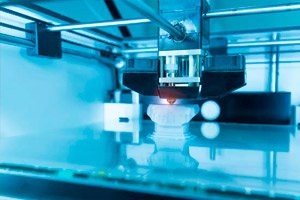
All iLive content is medically reviewed or fact checked to ensure as much factual accuracy as possible.
We have strict sourcing guidelines and only link to reputable media sites, academic research institutions and, whenever possible, medically peer reviewed studies. Note that the numbers in parentheses ([1], [2], etc.) are clickable links to these studies.
If you feel that any of our content is inaccurate, out-of-date, or otherwise questionable, please select it and press Ctrl + Enter.
3D printing technique makes it possible to produce customized pharmaceutical pills
Last reviewed: 02.07.2025
 ">
">A new 3D drug printing technique has made it possible to print multiple drugs into a single pill, paving the way for personalized pills that can deliver doses on a schedule.
Researchers from the University of Nottingham's Centre for Additive Manufacturing, in collaboration with the School of Pharmacy, have created personalised medicines using multifunctional inkjet 3D printing (MM-IJ3DP). The research has been published in the journal Materials Today Advances.
The team has developed an advanced method that enables the creation of personalised pharmaceutical tablets with tailored drug release profiles, providing more precise and effective treatment options for patients.
Multifunctional inkjet 3D printing (MM-IJ3DP) can print tablets that release drugs at a controlled rate determined by the tablet design. This is made possible by a new ink formula based on molecules sensitive to ultraviolet light. When printed, these molecules form a water-soluble structure.
The rate of drug release is controlled by the unique internal structure of the tablet, allowing the timing of dose release to be determined. This method allows multiple drugs to be printed into a single tablet, simplifying complex single-dose drug regimens.
Dr Infeng He, an assistant professor at the Centre for Additive Manufacturing in the Faculty of Engineering, who led the research, said: “This is an exciting step forward in the development of personalised medicines. This breakthrough not only highlights the potential of 3D printing to revolutionise drug delivery, but also opens up new avenues for the development of next-generation personalised medicines.”
"While promising, the technology faces challenges, including the need for more formulations to support a wider range of materials. Ongoing research aims to improve these aspects, increasing the potential for widespread application of MM-IJ3DP." - Professor Ricky Wildman
This technology will be particularly useful for creating medications that need to release drugs at specific times, making it ideal for treating diseases where timing and dosage precision are important. The ability to print 56 tablets in a single batch demonstrates the scalability of this technology, which offers great potential for the production of personalized medications.
Professor Felicity Rose, from the University of Nottingham’s School of Pharmacy, one of the study’s co-authors, said: “The future of prescription medicines is personalised and we know that up to 50% of people in the UK do not take their medication correctly, leading to poor health due to uncontrolled or incorrectly treated conditions. A single-pill approach would make it easier to take multiple medications at different times and this study is an exciting step in that direction.”
